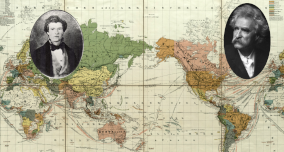A Farm of 240 acres, never referred to as a plantation. John Quarles had owned six slaves in 1840 and eleven in 1850, "many of them too old or too young to have been of much use on the farm." One in particular, Uncle Dan’l, might have been an inspiration for Twain’s character Jim.
An archaeological dig at the Quarles farmstead
Scharnhorst has suggested that the description of the Phelps farm in Adventures of Huckleberry Finn fits Quarles Farm:
Phelps’s was one of these little one-horse cotton plantations; and they all look alike. A rail fence round a two-acre yard; a stile, made out of logs sawed off and up-ended, in steps, like barrels of a different length, to climb over the fence with, and for the women to stand on when they are going to jump onto a horse; some sickly grass-patches in the big yard, but mostly it was bare and smooth, like an old hat with the nap rubbed off; big double log house for the white folks — hewed logs, with the chinks stopped up with mud or mortar, and these mud-stripes been whitewashed some time or another; round-log kitchen, with a big broad, open, but roofed passage, joining it to the house; log smoke-house back of the kitchen; three little log nigger-cabins in a row t’other side the smoke-house; one little hut all by itself, away down against the back fence, and some out-buildings down a piece the other side; ash-hopper, and big kettle to bile soap in, by the little hut; bench by the kitchen door, with bucket of water and a gourd; hound asleep there, in the sun; more hounds asleep, round about; about three shade trees, away off in a corner; some currant bushes and gooseberry bushes in one place by the fence; outside of the fence, a garden and a watermelon patch; then the cotton fields begins; and after the fields, the woods.
Adventures of Huckleberry Finn Page 276-7
The Golden Arm, from a letter to Joel Chandler Harris:
Now the doctor has been here & tried to interrupt my yarn about the Golden Arm, but I’ve got through, anyway.
Of course I tell it in the negro dialect—that is necessary; but I have not written it so, for I can’t it spell it in your matchless way. It is marvelous the way you & Cable spell the negro & creole dialects.
One Two grand features are lost in print: the [wierd] wailing, the rising & falling cadences of the wind, so easily mimicked with one’s mouth; & the impressive pauses & eloquent silences, & subdued utterances, toward the end of the yarn (which chain the attention of the children hand & foot, & they sit willth parted lips & breathless, to be wrenched limb from limb with the sudden & appalling “YOU got it!”) I have so gradually & impressively worked up the last act, with a “grown” audience, as to create a rapt & intense stillness; & then made them jump clear out of their skins, almost, with the final shout. It’s a lovely story to tell.
Old Uncle Dan’l, a slave of my uncle’s aged 60, used to tell us children yarns every night by the kitchen fire (no other light); & the last yarn demanded, every night, was this one. By this time there was but a ghostly blaze or two flickering about the back-log. We would huddle close about the old man, & begin to shudder with the first familiar words; but & under the spell of his impressive delivery we were always fell a prey to that climax at the end when the rigid black shape in the twilight sprang at us with a shout.
SLC to Joel Chandler Harris, 10 August 1881 · Elmira, N.Y., (UCCL 01997). 2021.
